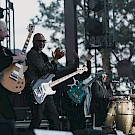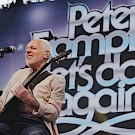 As inhabitants of the Pacific Northwest, artists here know a thing or two about harnessing inspiration from our natural landscape.
As inhabitants of the Pacific Northwest, artists here know a thing or two about harnessing inspiration from our natural landscape.
For Canadian-born folk singer-songwriter Elke Robitaille, the landscape surrounding her has shaped both her heart and music from childhood to her adult life as a Portlander.
When approaching the song “Westerly,” Robitaille writes that she was “inspired by growing up in a small mill town on the Northern Sunshine Coast in British Columbia, Canada. My hometown [Powell River] is very remote, and sits on the edge of the Salish Sea on the Strait of Georgia. Basically, I grew up surrounded by ocean inlets, islands, and peninsula that separated my town from the rest of the mainland. I wanted to write a song about being raised in this beautiful region, and how it left such a drastic imprint on my heart. ‘Westerly’ is an ode to the winds that blow west from the ocean to the land—‘prevailing westerlies.’”
She’s done her native land proud. Robitaille’s warm, honey vocals are enriched by JP Downer on bass and Tucker Jackson on pedal steel, weaving a fine folk tapestry filled with pride and strength.
 Tucked within the lyrics is an homage to Canada as a whole, harkening back to lines from the Canadian National Anthem. Robitaille adds, “I actually framed the chorus of ‘Westerly’ in alignment with the first few phrases of the Canadian national anthem, so the lines essentially match up. For example: "O Canada, my home and native land." Then, a few lines later: “The true North strong and free." Close listeners will notice “Westerly” mimicking that form as Robitaille sings: "It's my home, my native land. Oh, the North is calling me."
Tucked within the lyrics is an homage to Canada as a whole, harkening back to lines from the Canadian National Anthem. Robitaille adds, “I actually framed the chorus of ‘Westerly’ in alignment with the first few phrases of the Canadian national anthem, so the lines essentially match up. For example: "O Canada, my home and native land." Then, a few lines later: “The true North strong and free." Close listeners will notice “Westerly” mimicking that form as Robitaille sings: "It's my home, my native land. Oh, the North is calling me."
Take a listen and imagine the beauty of a simpler existence, one where you actually did move to Canada.



















